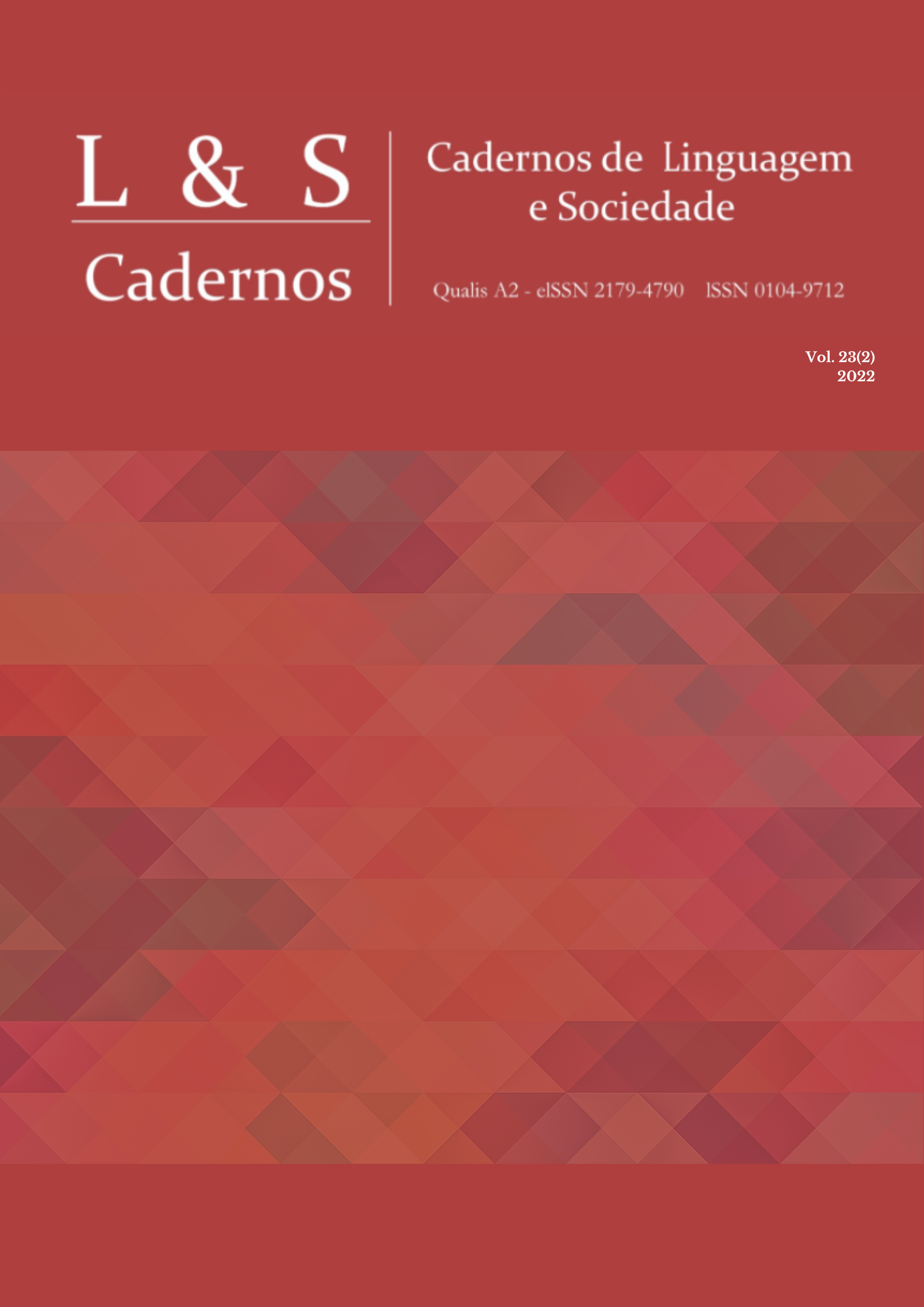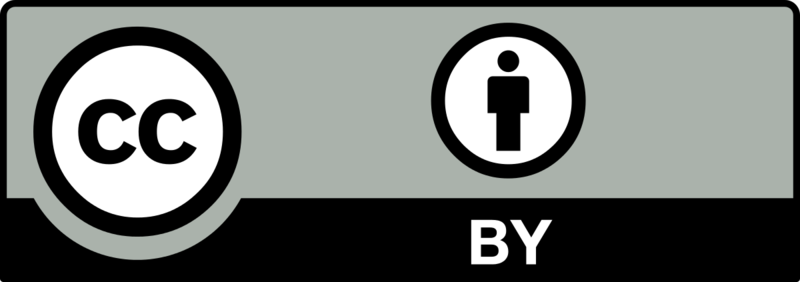The use of LGBTQIA+ slang and expressions by cis-heterosexual women
DOI:
https://doi.org/10.26512/les.v23i2.42475Keywords:
Queer Linguistics, Pajubá dialect., LGBTQIA , Language variationAbstract
Much of the Queer Linguistics research focuses on how members of the LGBTQIA+ community use language(s) and excludes people who identify as cisgender-heterosexual. Therefore, this study analyzes the sociolinguistic factors that influence the use of Pajubá, also known as the Brazilian LGBTQIA+ dialect, according to speakers who identify as female, cisgender, and heterosexual. Data comes from an online Qualtrics questionnaire completed by 387 cis-het women about their attitudes and use of Pajubá. Results show that these participants use Pajubá slang and expressions, although they are not always aware that they stem from a queer LGBTQIA+ community.
Downloads
References
ALONSO, M. C. The Development of Yoruba Candomble Communities in Salvador, Bahia, 1835-1986. Palgrave Macmillam, 2014.
BARROSO, R. R. Pajubá: o código linguístico da comunidade LGBT. Dissertação (Mestrado em Letras e Artes) - Escola Superior de Artes e Turismo, Universidade do Estado do Amazonas, Manaus, 2017.
BENISTE, J. Dicionário Yorubá - Português. São Paulo: Bertrand, 2011.
BORBA, R. Linguística Queer: Uma perspectiva pós-identitária para os estudos da linguagem. Revista Entrelinhas, v. 9, n. 1, p. 91-107, 2015.
BORBA, R. The interactional making of a “true transsexual”: Language and (dis)identification in trans-specific healthcare. International Journal of the Sociology of Language, v. 2019, n. 256, p. 21-55, 2019.
BORBA, R. Discursos transviados: por uma linguística queer. Editora Cortez, 2020.
BUTLER, J. Gender trouble: Feminism and the subversion of identity. New York/London: Routledge, 1990.
BUTLER, J. Excitable Speech: A politics of the performative. New York/London: Routledge, 1997.
CANDOMBLÉ AT A GLANCE. 2009. Disponível em: https://www.bbc.co.uk/religion/religions /candomble/ataglance/glance.shtml. Acesso em: 15 março 2021.
CRUZ, L.; TITO, R. d. A comunidade LGBT no desdobramento da língua iorubá. Cadernos do CNLF: Sociolinguística, dialetologia e geografía lingüística, v. 20, n.12, p. 9-21, 2016.
DYNES, W. R. Portugayese. In: S. O. Murray. (Ed.). Latin American male homosexualities. Albuquerque: University of New Mexico Pres, 1995, p. 256-263.
EBERHARD, D. M.; SIMONS, G. F.; FENNIG, C. D. (Eds.). Ethnologue: Languages of the World. Dallas, Texas: SIL International. 2022. Disponível em: https://www-ethnologue-com.ezproxy.leidenuniv.nl/language/yor. Acesso em: 12 fevereiro 2022.
G1. Educação: Enem 2018. 2018. Disponível em: G1: https://g1.globo.com/educacao /enem/2018/noticia/2018/11/05/veja-resolucao-de-questao-do-enem-que-aborda-status-do-pajuba-como-dialeto-secreto-dos-gays-e-travestis.ghtml. Acesso em: 15 março 2021.
GOMES, L. (2019). Escravidão–Vol. 1: Do primeiro leilão de cativos em Portugal até a morte de Zumbi dos Palmares (Vol. 1). Globo Livros.
HAYES, J. J. Gayspeak. Quarterly journal of speech, v. 62, n.3, p. 256-266, 1976.
KELSEY, M. Queer slang and negative identity: How GLBT individuals own and reject homophobic slang. In: B. Drushel; K. German (Eds.), Queer identities / Political realities. Cambridge Scholars Publishing, 2009, p. 155-180.
KINYUA, G. K. A lexical–semantic analysis of the language of the lesbian, gay bisexual and transgender communities in nairobi city county, kenya. Tese doutoral. Kenyatta University, 2017
KULICK, D. Gay and lesbian language. Annual review of anthropology, v. 29, n. 1, p. 243-285. 2000.
LAU, H. D. A (des) informação do bajubá: fatores da linguagem da comunidade LGBT para a sociedade. Temática, v. 11, n. 2, p. 90-101, 2015.
LAU, H. D. Será que toda “mona” fala “bichês”? A questão da linguagem e identidade da comunidade LGBT. Revista temática, v. 13, n. 3, 2017.
LAU, H. D.; SANCHES, G. J. A linguagem não-binária na língua portuguesa: possibilidades e reflexões making herstory. Revista X, v. 14, n. 4, p. 87-106, 2019.
LEAP, W. (Ed.). Beyond the lavender lexicon: Authenticity, imagination, and appropriation in lesbian and gay languages. Routledge, 1995.
LEWIS, E. S. Do “léxico gay” à Linguística Queer: desestabilizando a norma homossexual oculta nas Teorias Queer. Estudos Linguísticos, v. 47, n. 3, p. 675-690, 2018.
LEWIS, E. S. Por uma Linguística Cu(-ir). Cadernos de Linguagem e Sociedade, [S. l.], v. 21, n. 2, p. 327–349, 2020. DOI: 10.26512/les.v21i2.35174. Disponível em: https://periodicos.unb.br/index
.php/les/article/view/35174. Acesso em: 22 mar. 2022.
LIMA, C. H. L. d. Linguagens Pajubeyras: Re(ex)sistência cultural e subversão da heteronormatividade. Salvador, BA: Editora Devires, 2018.
LINDSTROM, L. Book Reviews: Beyond the lavender lexicon: Authenticity, imagination, and appropriation in lesbian and gay languages.; Queerly phrased: Language, gender, and sexuality. Society of lesbian and gay anthropologists newsletter, v. 20, p. 8-10, 1998.
LIVIA, A.; HALL, K. (Eds.). Queerly phrased: Language, gender, and sexuality. Oxford University Press, 1997.
LOPES, L. P. On being white, male and heterosexual: Multiple positionings in oral narratives. In: SCHRIFFRIN, D; FINNA A. B. d. (Eds.), Discourse and Identity. Cambridge: Cambridge University Press, 2006, p. 288-316.
LOPES, L. P. da. Por uma ideologia linguística responsiva à s teorizações Queer. Cadernos de Linguagem e Sociedade, [S. l.], v. 21, n. 2, p. 370–387, 2020. DOI: 10.26512/les.v21i2.35701. Disponível em: https://periodicos.unb.br/index.php/les/article/view/35701. Acesso em: 22 mar. 2022.
MATTOSO, K. d. Ser escravo no Brasil. São Paulo: Brasiliense, 2001.
MENDONÇA, N. A influência africana no português do Brasil. Rio de Janeiro: Sauer, 1933.
MOURA, J. R. Da sombra às cores: análise discursiva do dicionário LGBTs Aurélia. Rio de Janeiro: Universidade Federal do Rio de Janeiro, 2018.
MURRAY, S. O. Latin American male homosexualities. Albuquerque: University of New Mexico Press, 1995.
MURRAY, S. O., & ARBOLEDA, M. G. Stigma transformation and relexification: Gay in Latin America. In: MURRAY, S. O. Latin American male homosexualities. Albuquerque: University of New Mexico Press, 1995, p. 138-144.
NETTO JUNIOR, N. G. O percurso semântico de alguns vocábulos do pajubá: gírias faladas pelas bichas. Universidade de Brasília, 2018.
PRETI, D. A linguagem proibida: um estudo sobre a linguagem erótica. São Paulo: T. A. Queiroz, 1984.
RODRIGUES, N. Os africanos no Brasil. São Paulo: Nacional, 1932.
SCIPPER, V. A.; LIBI, F. Aurélia: a dicionária da língua afiada. São Paulo: Bispo, 2013.
SILVA, A. L. Gíria LGBT como empoderamento linguístico: a construção de sentidos no gênero "Meme". Trabalho de Conclusão de Curso (Licenciatura Plena em Letras) - Centro de Humanidades "Osmar de Aquino", Universidade Estadual da Paraíba, 2018.
SUE, V. M.; RITTER, L. A. Conducting Online Surveys (2nd ed.). Sage.
TREVISAN, J. S. Devassos no Paraíso: A homossexualidade no Brasil, da colônia à atualidade. Objetiva, 2018.
Downloads
Published
How to Cite
Issue
Section
License
Copyright (c) 2022 Cadernos de Linguagem e Sociedade do Programa de Pós-Graduação em Linguística da UnB é licenciado sob uma Licença Creative Commons Atribuição-Uso não-comercial-Vedada a criação de obras derivadas 3.0 Unported.

This work is licensed under a Creative Commons Attribution 4.0 International License.



